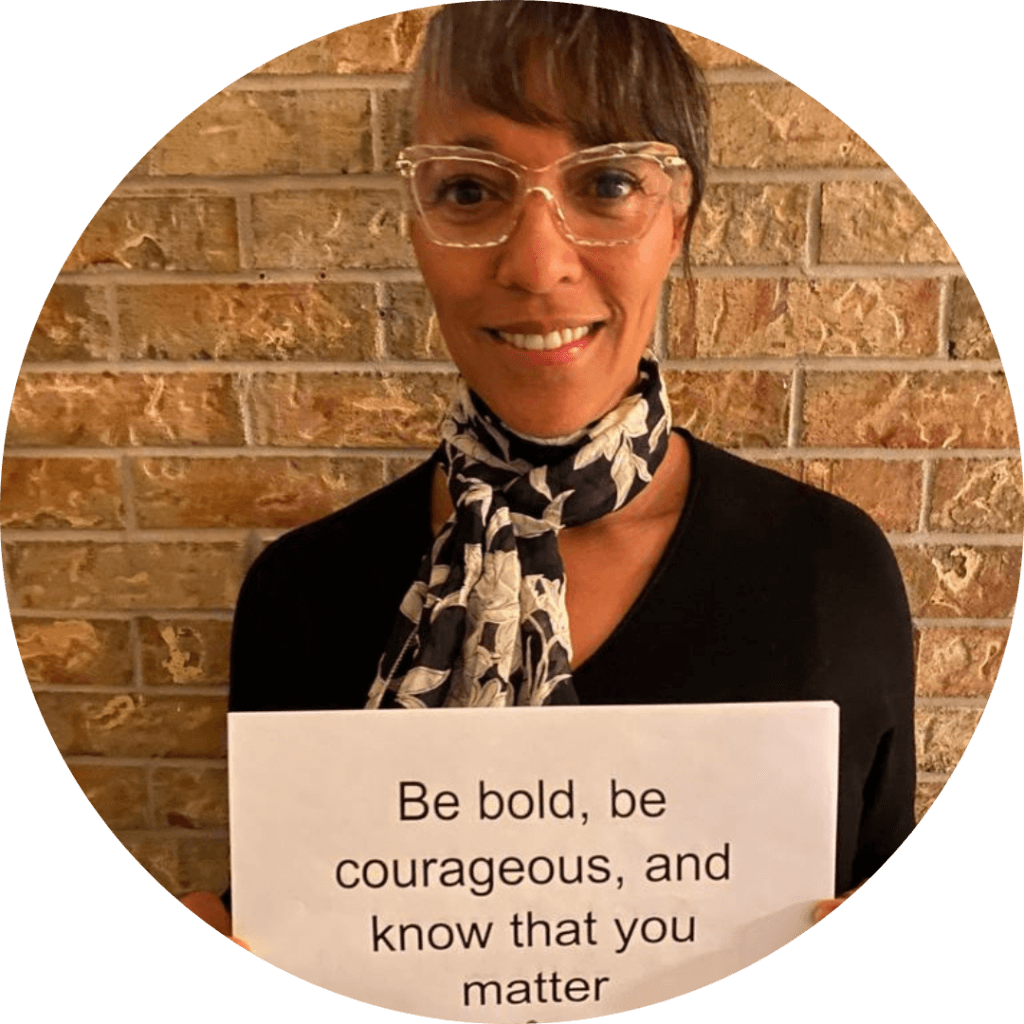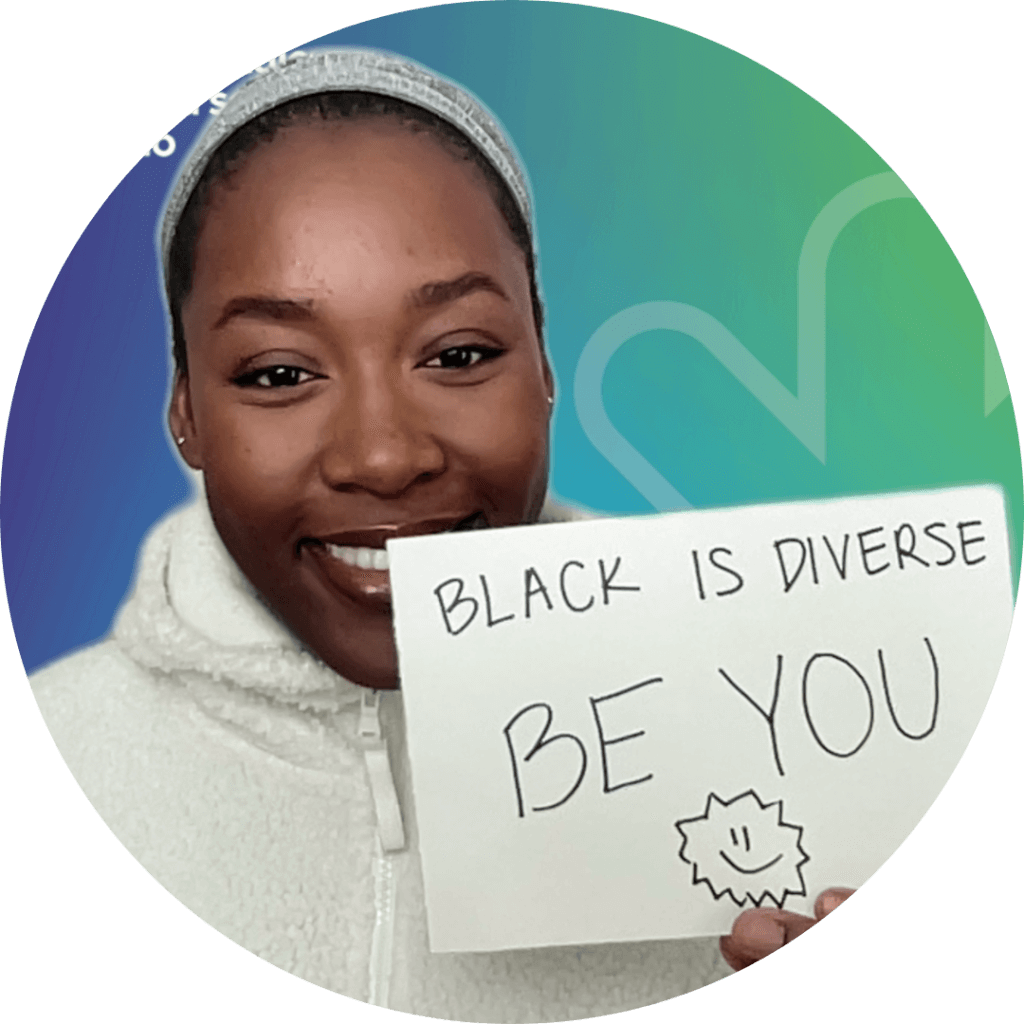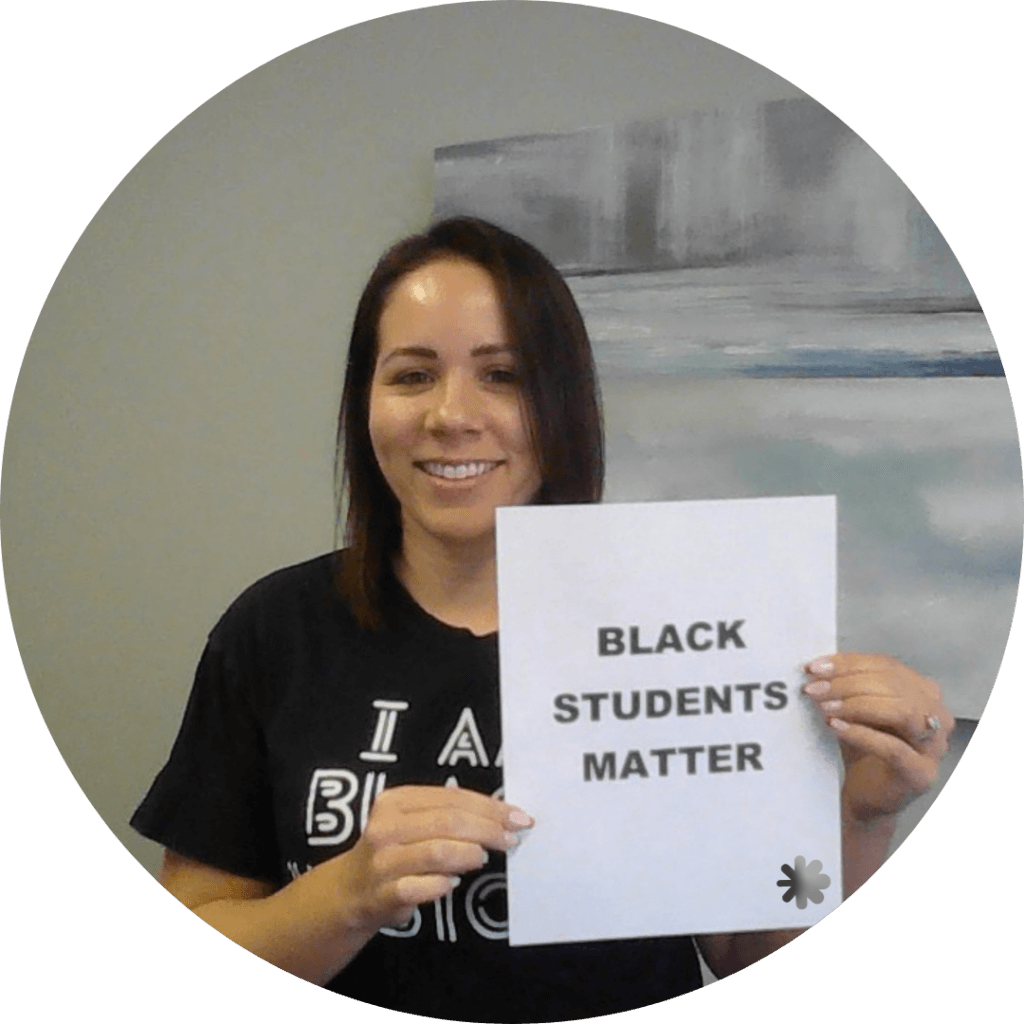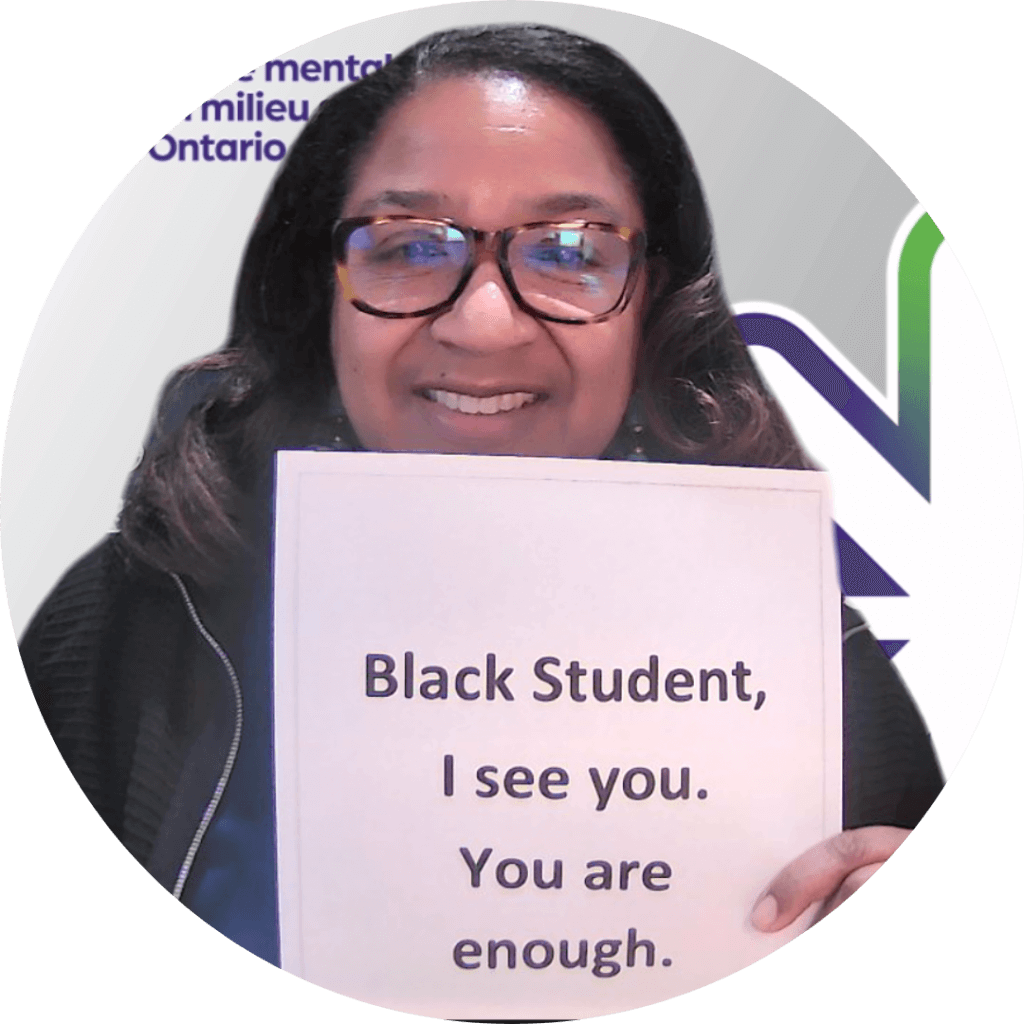A love letter to Black students: part 2
It was an honour and absolute privilege to share space with four colleagues that exude Black excellence. Patricia Codner, Tracey Grose, Toni Lauzon, and Joyce Erogun agreed to share some of their lived experiences and words of wisdom with us. This conversation reflected diverse experiences. It showed that Blackness is not a monolith, and that unity is found through acknowledging our similarities and our differences. All of which should be celebrated.
This blog post is the second in a series of four posts developed from the conversation.
Meet our colleagues

Patricia Codner
My name is Patricia Codner, and I’m currently at School Mental Health Ontario as the parent and caregiver engagement and literacy consultant on secondment* from the Halton Catholic District School Board as the chief social worker. I am a Black woman, a daughter. I’m a mother, a wife, an auntie, a friend, and a colleague.

Joyce Erogun
My name is Joyce Erogun. I’m a consultant at School Mental Health Ontario, in the role of student and parent/caregiver engagement team lead. My pronouns are she/her. I’m a Nigerian first-generation Canadian woman. I’m an older sister, a friend, and a partner.

Toni Lauzon
Toni Lauzon. Pronouns are she/her. Self-identify as Afro-Indigenous, or Black and Mi’kmaw to be specific. I am an equity and identity-affirming mental health consultant and implementation coach here at School Mental Health Ontario on secondment* from Greater Essex District School Board.

Tracey Grose
My name is Tracey Grose, and I’m a school social worker for over 20 years in Whitby, Ontario. I am a cisgender female, with pronouns she/her. I’m of Jamaican ancestry and I’m the culturally responsive practices lead and an implementation co-coach here at School Mental Health Ontario, on secondment* from the Durham District School Board.
*Secondment means that the person is temporarily working for School Mental Health Ontario while still being considered an employee of their school board. It’s similar to an exchange program in school.
What comes to mind when you think about Black history?
Patricia: I’ll go ahead. I immediately feel other, different, and then I dig deep to find my joy, my pride, my awesomeness, and all that being Black, enables me to learn. Through my varied experiences, some not so good, while others wonderful and edifying. I am grateful for my Black history in ways that it helps me to recognize who I am. I’m now being taught with great transparency about the horrific history of slavery while shining light on the brilliance of Black people in every aspect of our society
Toni : When I think about Black history, I think about first and foremost, the celebration of my ancestors, and their excellence but also the horrific challenges that they faced. For me, personally, I feel so fortunate to have grown up in North Buxton, a historic Black community, and one of the very few remaining Black Canadian settlements in Ontario – Canada, even.
And when I think of Black history, I think of… hmm! I don’t know. I guess I just am very fortunate to have been so immersed in Black culture from such a young age, but also to be so immersed in the truth. So, I feel ahead of the game in terms of like, there was never really an unlearning I had to do when it came to Black history because it was such a part of our culture growing up in North Buxton.
Blackness was always celebrated, understanding the truth, and understanding our history as a collective, but also my own family’s history and excellence were part of my upbringing. It was like, as soon as you turned a teenager, you worked at the Buxton Historic Museum. We were giving tours to people who were coming in, who wanted to know about Black history. So, to me, it was like, everybody wants to know about Black history. I’m a teenager, and people are coming to me and want to know this history. But the other part of that was like, as soon as I walked into that museum, you know, a woman who was like one of the most influential people in my life, 4-foot Margo Freeman, was like, “Here’s a book. This is about your great-great-grandparents.” And I was like, “There’s a book on my great-great-grandparents?” And she’s like, “There’s a story, and it is your story, and it is now within you to carry their story forward to take the power that was them, and to lead with that.” And I just think that was so defining for who I became, and the work that I do, and how I parent, and how I live my life. So, I’m just very fortunate that I had that opportunity ‘cause I know not everybody did.
Tracey: Wow! Thank you, Toni. That explains a lot about you.
When I think about Black history, I think about Black excellence and Black achievement, and I don’t want to be anything else other than Black. I am of Jamaican ancestry with mixed heritage. I have some cousins in my family who can pass as white, they represent multiple different identities of race. But I found that those family members struggled. I found that when you know your true identity, you do better. That’s how I was raised to think of myself, and I think about all the amazing things that Black people are responsible for, as it relates to culture and innovation and research.
It’s a history that’s been interrupted. Just wait.
I think about how there’s so much more about our history that needs to be explored and achieved. And I feel like it’s a history that’s been interrupted. And I get excited, and I see I’m involved in a lot of things within the community, like all Black. I take my children to enrichment programs. Luckily, I live in the GTA, where I can access those things, and I feel like, “Oh, my gosh!” When you are raised as a young person, in an environment that validates you, there’s no limit to what it is you can achieve. So, it’s a history that’s been interrupted. Just wait.
Joyce: When I think of Black history, I think of the depth, the variety, the connection, and the influence of Black people. How far back our histories go, our connected experiences, the influence of Black people in this world. I think about personally the hundreds of languages in my country. I think about my mother tongue. I think about the stories that my parents passed down to me. I think about visiting my grandfather and him taking me to his garden and showing me all of these herbs that I didn’t know about, that are medicinal that keep him at like 80-something years old strong enough to go up and down 3 flights of stairs every day! So, I think about joy and kind of tied to what Toni said, that, like we all kind of hold a piece of our history, and I was thinking it sort of like crumbs – crumbs that we hold…but it’s not that they get smaller. It’s- it’s the same kind of energies, the same kind of power that we all hold, that’s passed from generation to generation to generation. And so, I see that in my parents I see that my grandparents I see that in myself and my brothers. And yeah, joy is what comes to mind as well.
What does Black History Month mean to you?
Patricia: I love these questions, but, you know, sometimes when I reflect on it, I must to try hard to keep it succinct, because I would go on forever. But in essence for me, Black History Month provides dedicated time to highlight that Black people must be seen, appreciated, valued, and respected as human beings.Black History Month created a space for schools and society to talk about the resilience of Black people. Despite our history of oppression, due to slavery, which results in the ongoing racism that we face today.
Black History Month provides dedicated time to highlight that Black people must be seen, appreciated, valued, and respected as human beings.
It’s an opportunity to talk about our history, the impact on our lives, and how the systems in place were designed to keep us in mental slavery, which continues to plague Black people in general with devastating impacts in every aspect of their lives. It is an opening to teach children about the destructive history of slavery. The impact on the lives of Black people, the nullification of Black people, not seen as human with capacity to achieve greatness in the face of extraordinary circumstances.
Black History Month creates a chance to shine light on our history, our creativity, our brilliance, our strong sense of community talents, strengths, knowledge, ways of being, and most of all, our view that it takes a village to raise a child. I value that whatever is being created for us should not be done without our voice.
Joyce: Black History Month to me is complex.
It means truth, and acknowledgement of the issues of the past and the issues of today. It’s a celebration of beauty, resilience, and the greatness of Black people.
But at the same time, its existence is a reminder of really terrible experiences, and how that has impacted Black people as a community regardless of where they’ve come from. And I’m thinking about the racism that continues to exist in all of our systems.
Black History Month shines a light on that truth, and who we are today, and have always been, which has been beautiful, bright, colourful and joyful people. Yeah, so it’s-it’s a bit of everything. It’s complex. It’s the past. And it’s just like a reminder of who we’ve always been. Always. Even when history has tried to tell us otherwise.
Black History Month shines a light on that truth, and who we are today, and have always been, which has been beautiful, bright, colourful and joyful people.
Toni: I appreciate that sharing Joyce – it kind of took me in a little bit of direction when you said complex because I would agree that when I think about Black History Month, I think about it like that.
I just love how it’s a sea of Black pride and Black love.
I had a conversation with my brother last night because as much as he’s not in the academic space for anti-Black racism, he’s very much an activist in our community. I chatted with him last night, and I was like, you know, we never like actually sat down and talked about Black History Month, and like, what does that mean to me? I’ve never really reflected on how it makes me feel, or, you know, had an opportunity to really think about that in a good way.
So, we were having this chat, and he’s like, “What’s your favourite part? When February first comes around. What do you like about it?” I just love how it’s a sea of Black pride and Black love. You see it everywhere. It’s imagery, there’s gathering, there are events, and it’s just like – it’s so validating and affirming and obviously needs to be here all the time. It’s just my favourite part. When February comes around. It’s just everywhere. It’s all over social media. It’s just in your face, right? And I just think, like, I actually really do appreciate that there’s some concentrated time. I wonder if there wasn’t a Black History Month if it would be such a concentrated time that we would remind ourselves and gather in that unity of Black love and Black pride, so that’s a reason why I love it.
The one thing that I think becomes complex to me is that, I was never raised to understand Black history as just slavery, and oftentimes I feel like Black history month is really focused on slavery. Even growing up in a Black community that was settled for enslaved peoples, my ancestors were always referred to as freedom fighters. We would say in my family, like, slavery is a part of history. And if I had to define whose history, it would be white history, it would not be Black history.
So, I appreciate that it’s a time when people’s ears are opened and are wanting to learn. I think there’s a great opportunity to talk about truth which includes the enslavement of Black people because we cannot ignore that. However, I think we also need to remember like, that’s not our only history. Like Joyce’s point, we were always people before this. To identify, as you know, the history of being enslaved people without humanness, without citizenship… That’s not where we started. I don’t want to think about the history as just being enslaved.
I know that was very confusing and muddled. Sorry. I think I’ve never really had the opportunity, so I appreciate it to really reflect on what Black History Month means.
Tracey: Thank you, Toni. Yeah, it looks like we get deeper with each person.
Celebrating our history for me, particularly in this decade, is with the UN’s declaration of the International Decade for People of African Descent. Canada took a couple of years to adopt it. But this whole idea of the acknowledgment, of proclaiming this decade, is the international community recognizes that people of African ancestry represent a distinct group whose human rights have been violated and so we were going to promote in this decade the protection, and the upliftment of people.
I’m just reading some statistics – around 200 million people identify themselves as being of African descent in the Americas, and many millions more across the Earth outside of the African continent. So, every day I think about my connection to that which there was an insistent effort to dissolve our positive connection to the African continent and African identities in the colonies. Why was there such a consistent intentional effort to disconnect people of African ancestry to their African heritage and identity?
Even just last week as I’m listening to my mother-in-law speak, and the cadence in her voice, she’s very oral in her tradition. She tells us stories about the people in the Race Course area in Jamaica where she grew up. She shares her whole town’s history in her oral tradition. As she tells the stories, and she tells them repeatedly, there are little life messages in them. And I’m like this is African oral tradition, and she doesn’t even know that. And then the cadence in her voice, I’m like, you know, my gosh! Like if it wasn’t English, it would, perhaps be Hausa or Igbo, and like I can hear it! So, for me, every day there’s new things I discover. We are from the Continent, and we didn’t even know that in the pure form. So, it just gets me excited and like what Joyce was saying about her grandfather and Toni, what you’re saying, we must really hold on to those pieces because like there was an effort to have us not connected to our ancestry in our history, and we can go and reclaim it. So Black history is reclaiming all of that which we are, which we kept in our DNA.
Black history is reclaiming all of that which we are, which we kept in our DNA.
Thank you for reading through part two of this four part series. Check out the next post where we ask Patricia, Tracey, Toni, and Joyce “What can schools/boards do to commemorate Black excellence in their school communities?”
This conversation was facilitated by Elo Igor and Alina Medeiros.
